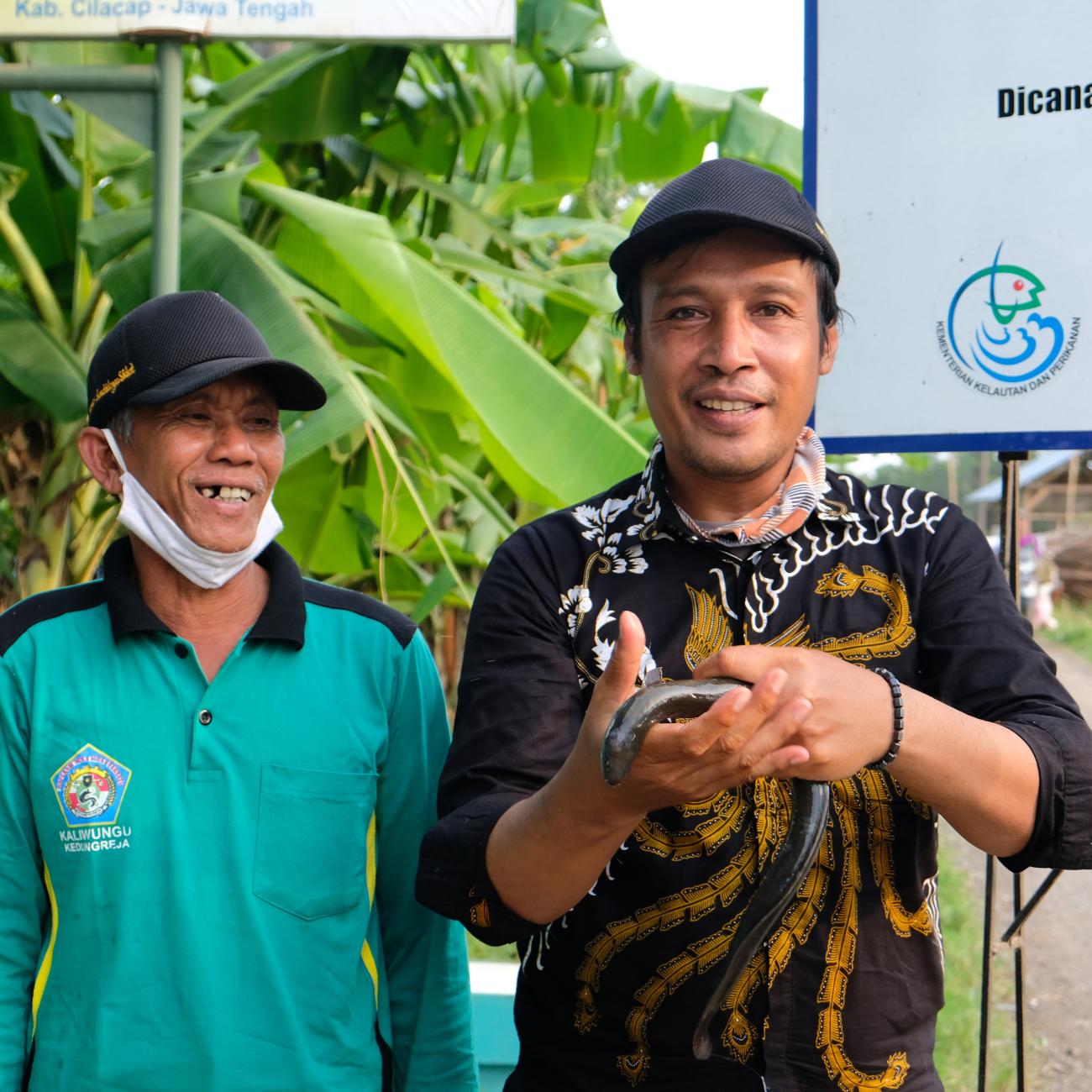Unagi is synonymous with Japan. This catadromus fish even has special day(s) every summer, Doyo no Ushi no Hi. On that day the Japanese people enjoy a bowl of warm rice with grilled eel, which they believe improves vitality amidst the hot weather. This tradition has been going on for hundreds of years. But now the eels that are used no longer comes from Japan.
International Union for Conservation of Nature (IUCN) has categorized Japanese eel (Anguilla japonica) on the Red List of Threatened Species. Their passion for eel — about 70% of the world's eel consumption is in Japan — encourages them to seek new sources of supply from around the world, including Indonesia.
The taste and texture of Anguilla bicolor eel cultivated in Indonesia is favored by Japanese market. One of the sources is Mina Sidat Bersatu Cooperative from Cilacap Regency, Central Java, a community eel farmers assisted by FAO’s IFish Project. Unfortunately, COVID-19 pandemic had hit their eel cultivation business.
"The first five months of the COVID-19 pandemic were the hardest, we had zero income. Eel supplies to restaurants and exports to Japan have all stopped," said Ruddy Sutomo, the pioneer of the Mina Sidat Bersatu Cooperative. Implementation of restrictions on mobility, has slowed down restaurant and hotel businesses.
This condition forced cooperative members to rack their brains, because operations in the eel cultivation ponds cannot stop. “Unlike other freshwater fish, good quality eels cannot sustain with moss and leaves. They have to be fed pellets so that the meat is soft and tastes good."
Ruddy's familiarity with eel cultivation began in 2009. “A friend of mine asked me if there was unagi in my area. The name was very foreign to me, but when the photo was shown it turned out to be eel, which was abundant in my village in Cilacap." Along with his success in cultivating eels, he initiated the formation of Mina Sidat Bersatu Cooperative. Currently, Ruddy, together with cooperative members and partners, manages six hectares of eel cultivation ponds.
Working with FAO
IFish project—a joint project between FAO and Ministry of Marine Affairs and Fisheries with support from GEF—endorsed cultivation of eel in Mina Sidat Bersatu Cooperative by making it a pilot project location for community eel cultivation. IFish project built cooperation scheme between cooperative and eel cultivation company, to transfer technology and produce cultivation guides that can be used by other community groups.
"More and more people are willing to join Mina Sidat Bersatu Cooperative since we received assistance from FAO," said Ruddy.
The cooperative is also committed to allocating 2.5% of its harvest to be released, considering that until now eel seedlings cannot be bred in captivity. " We can’t let Indonesian eel get into IUCN Red List. Once it happens, we can't cultivate it anymore," explained Ruddy.
To that end, IFish Project supports Mina Sidat Bersatu Cooperative’s sustainable initiative by surveying suitable locations for release, tagging eels and building monitoring mechanism for released eels.
Surviving the Pandemic Without Sacrificing Quality
With 65% of their orders came from Japan the closure of eel export due to COVID-19 pandemic has been a big blow for the cooperative. "We measure precisely how much feed is given. If too much feed is given, the size of the eel becomes too large and exceeds the market size accepted by Japan. Sure, adjustments are made, but quality must not be compromised. "
Commitment to quality eventually pays off. Starting from August 2020 a Michelin Star-Japanese restaurant in Jakarta regularly orders eel from Mina Sidat Bersatu Cooperative . "Every month we send 800 - 1,200 kg of eel to the restaurant." Live eels can be seen in container inside the restaurant. Cooked with a dash of spice, it tastes much better than frozen eel products available in supermarkets. The skin of the eel is thin, the thick flesh is juicy and tender, and there is no scent of mud at all. Characteristics of premium quality eel, loved by the Japanese.
Ruddy and fellow members of Mina Sidat Bersatu Cooperative are still waiting for the reopening of export to Japan. "With regular orders from the restaurant , we could sustain our operations. We have also started to produce several derivative products, such as eel floss, meatballs and eel bone chips. However, our income is only 30% of what we had before the pandemic. Therefore we really hope we can start exporting to Japan soon,"said Ruddy.



